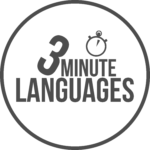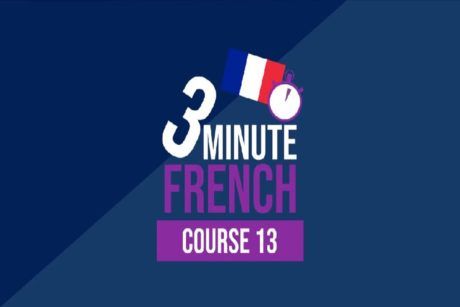Learn new words and phrases, and useful adverbs to expand your conversations in this 3-Minute French Course Fifteen.
Read more.Instructor
Hola, bonjour, olá, hallo and ciao! I'm Kieran and I'm a language tutor based in the UK. I teach French, Spanish, German, Italian and Portuguese.
Buy this course for $199 $10
and keep lifetime access.
Access all courses in our library for only $9/month with All Access Pass
About This Course
Who this course is for:
- Anybody who enjoys the 3 Minute French method and wants to build more on what has been learnt so far
What you’ll learn:
- New words and phrases to expand your conversations
- Useful adverbs for talking about how often things happen
- The two different ways to say “know” in French
- Learn about the word “y” in French and all the expressions you can form with it
- Talk about your favourite things
- Learn vocabulary to talk about your hobbies and favourite activities
- Learn the seasons in French
- Get some new phrases you can use to give your opinion
- Look at the word “pour” in more detail
- Learn about possessive adjectives and possessive pronouns in French
- Look at how to use definite articles, indefinite articles and partitive articles
- Have a look at French-English cognates and learn some tricks for turning English words into French words
Requirements:
- Make sure that you are familiar with everything learnt in 3 Minute French courses One through Fourteen
Welcome to 3 Minute French Course Fifteen, covering lessons 126 to 134. In this installment, we embark on an exhilarating journey of linguistic growth, delving into the richness of verbs, adjectives, nouns, and adverbs. Additionally, we’ll delve into a profound exploration of concepts we’ve previously encountered, enhancing our comprehension and command of the language.
In this course, we’re going to learn lots of new verbs, adjectives, nouns and adverbs, but we’re also going to look in more detail at some of what we’ve already learnt.
With languages, it’s often not a good idea to learn everything there is about a word or a phrase the first time you see it, as this can be overwhelming and you’ll miss out on the beauty of discovering things at a more natural pace.
Progressing further, we uncovered the synergy between “faire” and other verbs to express actions in progress.
If we’d learnt all of this in one go, it would have been too overwhelming and we wouldn’t have been able to take it all in. However, because we spread it out, we were able to digest the small nuggets of information more naturally over time. This is what language learning is all about – learning small nuggets of information, becoming expert at them and then adding new information to it. When we were children, we didn’t learn to speak in one weekend. Even though we were constantly surrounded by our mother language all day, every day for years on end, our brains didn’t let us take it all in one sitting, and this is because it would have been too overwhelming. Instead, babies learn singular words first, then they start to put two or three words together, then they might be able to use them to ask a question, gradually acquiring, practising and mastering the language at a natural pace.
Within this course, the pursuit of discovery reigns supreme. We venture to broaden our grasp of familiar territories, cultivating innovative modes of expression. A focal point entails discerning variances between verbs like “connaître” and “savoir,” both signifying “to know,” and navigating the intricacies of seemingly basic elements, such as articles.
Unraveling the subtleties of articles—words like “the,” “a,” and “some”—comprises an essential facet of our journey. We shall scrutinize their application in French and English, unearthing the rules that underlie their usage. As we delve deeper, terms like “countable” and “uncountable” nouns become our allies, enabling us to master article regulations.
Our linguistic adventure also encompasses possessive adjectives (“my,” “your,” “his…”) and possessive pronouns (“mine,” “yours,” “his…”). One riveting lesson tackles the realm of cognates—words identical or akin in two languages. Think “restaurant,” an identical term in French and English, serving as a shining exemplar. Unlocking cognate principles empowers us to effortlessly translate myriad English words into French.
Start learning more with this 3 Minute French Course Fifteen installment now.
Merci beaucoup 🙂
Check out my 3-Minute German course to add another language to your learning journey!
Our Promise to You
By the end of this course, you will have learned more French words and phrases.
10 Day Money Back Guarantee. If you are unsatisfied for any reason, simply contact us and we’ll give you a full refund. No questions asked.
Get started today!
Course Curriculum
| Section 1 - Introduction | |||
| Course 15 Introduction | 00:00:00 | ||
| Section 2 - Lesson 126 | |||
| Lesson 126a | 00:00:00 | ||
| Lesson 126b | 00:00:00 | ||
| Lesson 126c | 00:00:00 | ||
| Lesson 126d | 00:00:00 | ||
| Lesson 126e | 00:00:00 | ||
| Lesson 126f | 00:00:00 | ||
| Lesson 126g | 00:00:00 | ||
| Lesson 126h | 00:00:00 | ||
| Lesson 126i | 00:00:00 | ||
| Lesson 126j | 00:00:00 | ||
| Lesson 126k | 00:00:00 | ||
| Lesson 126l | 00:00:00 | ||
| Lesson 126m | 00:00:00 | ||
| Section 3 - Lesson 127 | |||
| Lesson 127a | 00:00:00 | ||
| Lesson 127b | 00:00:00 | ||
| Lesson 127c | 00:00:00 | ||
| Lesson 127d | 00:00:00 | ||
| Lesson 127e | 00:00:00 | ||
| Lesson 127f | 00:00:00 | ||
| Lesson 127g | 00:00:00 | ||
| Lesson 127h | 00:00:00 | ||
| Lesson 127i | 00:00:00 | ||
| Lesson 127j | 00:00:00 | ||
| Lesson 127k | 00:00:00 | ||
| Lesson 127l | 00:00:00 | ||
| Lesson 127m | 00:00:00 | ||
| Section 4 - Lesson 128 | |||
| Lesson 128a | 00:00:00 | ||
| Lesson 128b | 00:00:00 | ||
| Lesson 128c | 00:00:00 | ||
| Lesson 128d | 00:00:00 | ||
| Lesson 128e | 00:00:00 | ||
| Lesson 128f | 00:00:00 | ||
| Lesson 128g | 00:00:00 | ||
| Lesson 128h | 00:00:00 | ||
| Lesson 128i | 00:00:00 | ||
| Lesson 128j | 00:00:00 | ||
| Lesson 128k | 00:00:00 | ||
| Lesson 128l | 00:00:00 | ||
| Lesson 128m | 00:00:00 | ||
| Section 5 - Lesson 129 | |||
| Lesson 129a | 00:00:00 | ||
| Lesson 129b | 00:00:00 | ||
| Lesson 129c | 00:00:00 | ||
| Lesson 129d | 00:00:00 | ||
| Lesson 129e | 00:00:00 | ||
| Lesson 129f | 00:00:00 | ||
| Lesson 129g | 00:00:00 | ||
| Lesson 129h | 00:00:00 | ||
| Lesson 129i | 00:00:00 | ||
| Lesson 129j | 00:00:00 | ||
| Lesson 129k | 00:00:00 | ||
| Lesson 129l | 00:00:00 | ||
| Lesson 129m | 00:00:00 | ||
| Lesson 129n | 00:00:00 | ||
| Lesson 129o | 00:00:00 | ||
| Lesson 129p | 00:00:00 | ||
| Lesson 129q | 00:00:00 | ||
| Lesson 129r | 00:00:00 | ||
| Lesson 129s | 00:00:00 | ||
| Lesson 129t | 00:00:00 | ||
| Lesson 129u | 00:00:00 | ||
| Lesson 129v | 00:00:00 | ||
| Section 6 - Lesson 130 | |||
| Lesson 130a | 00:00:00 | ||
| Lesson 130b | 00:00:00 | ||
| Lesson 130c | 00:00:00 | ||
| Lesson 130d | 00:00:00 | ||
| Lesson 130e | 00:00:00 | ||
| Lesson 130f | 00:00:00 | ||
| Lesson 130g | 00:00:00 | ||
| Lesson 130h | 00:00:00 | ||
| Lesson 130i | 00:00:00 | ||
| Lesson 130j | 00:00:00 | ||
| Lesson 130k | 00:00:00 | ||
| Lesson 130l | 00:00:00 | ||
| Lesson 130m | 00:00:00 | ||
| Lesson 130n | 00:00:00 | ||
| Lesson 130o | 00:00:00 | ||
| Lesson 130p | 00:00:00 | ||
| Lesson 130q | 00:00:00 | ||
| Lesson 130r | 00:00:00 | ||
| Lesson 130s | 00:00:00 | ||
| Lesson 130t | 00:00:00 | ||
| Section 7 - Lesson 131 | |||
| Lesson 131a | 00:00:00 | ||
| Lesson 131b | 00:00:00 | ||
| Lesson 131c | 00:00:00 | ||
| Lesson 131d | 00:00:00 | ||
| Lesson 131e | 00:00:00 | ||
| Lesson 131f | 00:00:00 | ||
| Lesson 131g | 00:00:00 | ||
| Lesson 131h | 00:00:00 | ||
| Lesson 131i | 00:00:00 | ||
| Lesson 131j | 00:00:00 | ||
| Lesson 131k | 00:00:00 | ||
| Lesson 131l | 00:00:00 | ||
| Lesson 131m | 00:00:00 | ||
| Lesson 131n | 00:00:00 | ||
| Lesson 131o | 00:00:00 | ||
| Lesson 131p | 00:00:00 | ||
| Lesson 131q | 00:00:00 | ||
| Section 8 - Lesson 132 | |||
| Lesson 132a | 00:00:00 | ||
| Lesson 132b | 00:00:00 | ||
| Lesson 132c | 00:00:00 | ||
| Lesson 132d | 00:00:00 | ||
| Lesson 132e | 00:00:00 | ||
| Lesson 132f | 00:00:00 | ||
| Lesson 132g | 00:00:00 | ||
| Lesson 132h | 00:00:00 | ||
| Lesson 132i | 00:00:00 | ||
| Lesson 132j | 00:00:00 | ||
| Lesson 132k | 00:00:00 | ||
| Lesson 132l | 00:00:00 | ||
| Lesson 132m | 00:00:00 | ||
| Lesson 132n | 00:00:00 | ||
| Lesson 132o | 00:00:00 | ||
| Lesson 132p | 00:00:00 | ||
| Lesson 132q | 00:00:00 | ||
| Lesson 132r | 00:00:00 | ||
| Lesson 132s | 00:00:00 | ||
| Lesson 132t | 00:00:00 | ||
| Lesson 132u | 00:00:00 | ||
| Lesson 132v | 00:00:00 | ||
| Lesson 132w | 00:00:00 | ||
| Lesson 132x | 00:00:00 | ||
| Lesson 132y | 00:00:00 | ||
| Lesson 132z | 00:00:00 | ||
| Section 9 - Lesson 133 | |||
| Lesson 133a | 00:00:00 | ||
| Lesson 133b | 00:00:00 | ||
| Lesson 133c | 00:00:00 | ||
| Lesson 133d | 00:00:00 | ||
| Lesson 133e | 00:00:00 | ||
| Lesson 133f | 00:00:00 | ||
| Lesson 133g | 00:00:00 | ||
| Lesson 133h | 00:00:00 | ||
| Lesson 133i | 00:00:00 | ||
| Lesson 133j | 00:00:00 | ||
| Lesson 133k | 00:00:00 | ||
| Lesson 133l | 00:00:00 | ||
| Lesson 133m | 00:00:00 | ||
| Lesson 133n | 00:00:00 | ||
| Lesson 133o | 00:00:00 | ||
| Lesson 133p | 00:00:00 | ||
| Lesson 133q | 00:00:00 | ||
| Lesson 133r | 00:00:00 | ||
| Lesson 133s | 00:00:00 | ||
| Lesson 133t | 00:00:00 | ||
| Lesson 133u | 00:00:00 | ||
| Lesson 133v | 00:00:00 | ||
| Lesson 133w | 00:00:00 | ||
| Lesson 133x | 00:00:00 | ||
| Lesson 133y | 00:00:00 | ||
| Lesson 133z1 | 00:00:00 | ||
| Lesson 133z2 | 00:00:00 | ||
| Lesson 133z3 | 00:00:00 | ||
| Lesson 133z4 | 00:00:00 | ||
| Lesson 133z5 | 00:00:00 | ||
| Section 10 - Lesson 134 | |||
| Lesson 134a | 00:00:00 | ||
| Lesson 134b | 00:00:00 | ||
| Lesson 134c | 00:00:00 | ||
| Lesson 134d | 00:00:00 | ||
| Lesson 134e | 00:00:00 | ||
| Lesson 134f | 00:00:00 | ||
| Lesson 134g | 00:00:00 | ||
| Lesson 134h | 00:00:00 | ||
| Lesson 134i | 00:00:00 | ||
| Lesson 134j | 00:00:00 | ||
| Lesson 134k | 00:00:00 | ||
| Lesson 134l | 00:00:00 | ||
| Lesson 134m | 00:00:00 | ||
| Lesson 134n | 00:00:00 | ||
| Lesson 134o | 00:00:00 | ||
| Lesson 134p | 00:00:00 | ||
| Lesson 134q | 00:00:00 | ||
| Lesson 134r | 00:00:00 | ||
| Lesson 134s | 00:00:00 | ||
| Lesson 134t | 00:00:00 | ||
| Lesson 134u | 00:00:00 | ||
| Lesson 134v | 00:00:00 | ||
| Lesson 134w | 00:00:00 | ||
| Lesson 134x | 00:00:00 | ||
| Lesson 134y | 00:00:00 | ||
| Lesson 134z1 | 00:00:00 | ||
| Lesson 134z2 | 00:00:00 | ||
| Lesson 134z3 | 00:00:00 | ||
| Lesson 134z4a | 00:00:00 | ||
| Lesson 134z4b | 00:00:00 | ||
| Lesson 134z4c | 00:00:00 | ||
| Lesson 134z4d | 00:00:00 | ||
| Lesson 134z4e | 00:00:00 | ||
| Lesson 134z5a | 00:00:00 | ||
| Lesson 134z5b | 00:00:00 | ||
| Lesson 134z5c | 00:00:00 | ||
| Lesson 134z5d | 00:00:00 | ||
| Lesson 134z6 | 00:00:00 | ||
| Lesson 134z7 | 00:00:00 | ||




